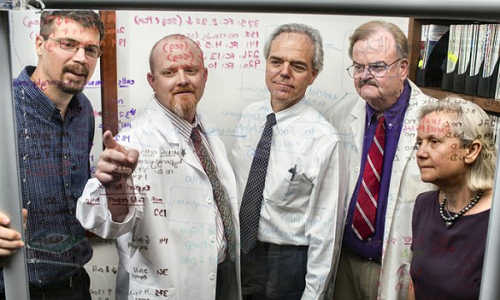Microbes may just be the next diet craze. Researchers have programmed bacteria to generate a molecule that, through normal metabolism, becomes a hunger-suppressing lipid. Mice that drank water laced with the programmed bacteria ate less, had lower body fat and staved off diabetes — even when fed a high-fat diet — offering a potential weight-loss strategy for humans.
The team will describe their approach in one of nearly 11,000 presentations at the 249th National Meeting & Exposition of the American Chemical Society (ACS), the world’s largest scientific society, taking place here through Thursday.
Photo credit: Joe Howell
Obesity strongly increases the risk for developing several diseases and conditions, such as heart disease, stroke, type 2 diabetes and some types of cancer. One in three Americans is obese, and efforts to stem the epidemic have largely failed. Lifestyle changes and medication typically achieve only modest weight loss, and most people regain the weight. In recent years, numerous studies have shown that the population of microbes living in the gut may be a key factor in determining the risk for obesity and related diseases, suggesting that strategically altering the gut microbiome may impact human health.
One advantage to microbial medicine would be that it’s low maintenance, says Sean Davies, Ph.D. His goal is to produce therapeutic bacteria that live in the gut for six months or a year, providing sustained drug delivery. This is in contrast to weight-loss drugs that typically need to be taken at least daily, and people tend not to take their medications as directed over time. “So we need strategies that deliver the drug without requiring the patient to remember to take their pills every few hours,” Davies says.
For a therapeutic molecule, Davies and colleagues at Vanderbilt University selected N-acyl-phosphatidylethanolamines (NAPEs), which are produced in the small intestine after a meal and are quickly converted into N-acyl-ethanolamines (NAEs), potent appetite-suppressing lipids. The researchers altered the genes of a strain of probiotic bacteria so it would make NAPEs. Then they added the bacteria to the drinking water of a strain of mice that, fed a high-fat diet, develop obesity, signs of diabetes and fatty livers.
Compared to mice who received plain water or water containing control, non-programmed bacteria, the mice drinking the NAPE-making bacteria gained 15 percent less weight over the eight weeks of treatment. In addition, their livers and glucose metabolism were better than in the control mice. The mice that received the therapeutic bacteria remained lighter and leaner than control mice for up to 12 weeks after treatment ended.
In further experiments, Davies’ team found that mice that lacked the enzyme to make NAEs from NAPEs were not helped by the NAPE-making bacteria; but this could be overcome by giving the mice NAE-making bacteria instead. “This suggests that it might be best to use NAE-making bacteria in eventual clinical trials,” says Davies, especially if the researchers find that some people don’t make very much of the enzyme that converts NAPEs to NAEs. “We think that this would work very well in humans.”
The main obstacle to starting human trials is the potential risk that a treated person could transmit these special bacteria to another by fecal exposure. “We don’t want individuals to be unintentionally treated without their knowledge,” says Davies. “Especially because you could imagine that there might be some individuals, say the very young or old or those with specific diseases, who could be harmed by being exposed to an appetite-suppressing bacteria. So, we are working on genetically modifying the bacteria to significantly reduce its ability to be transmitted.”
Story Source:
The above story is based on materials provided by American Chemical Society.





